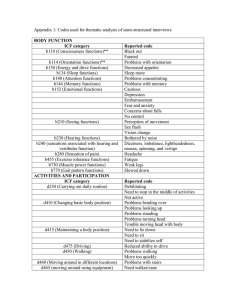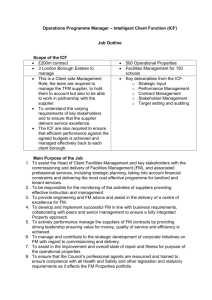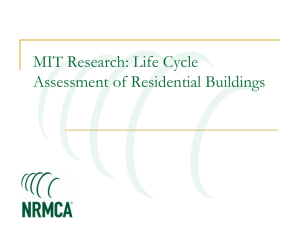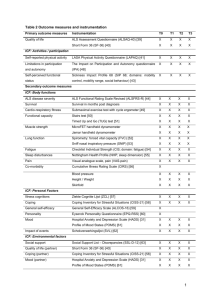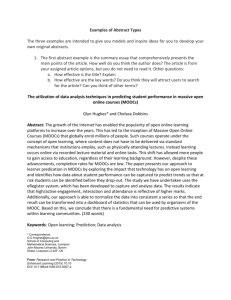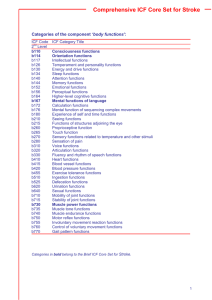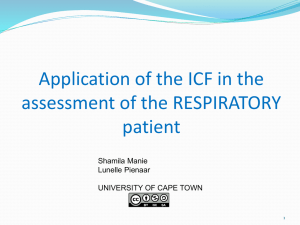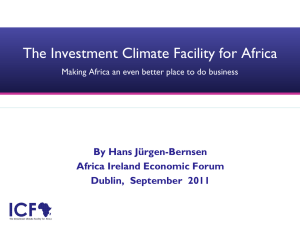Why The Investment Climate for Africa Deserves U.S. Support
advertisement
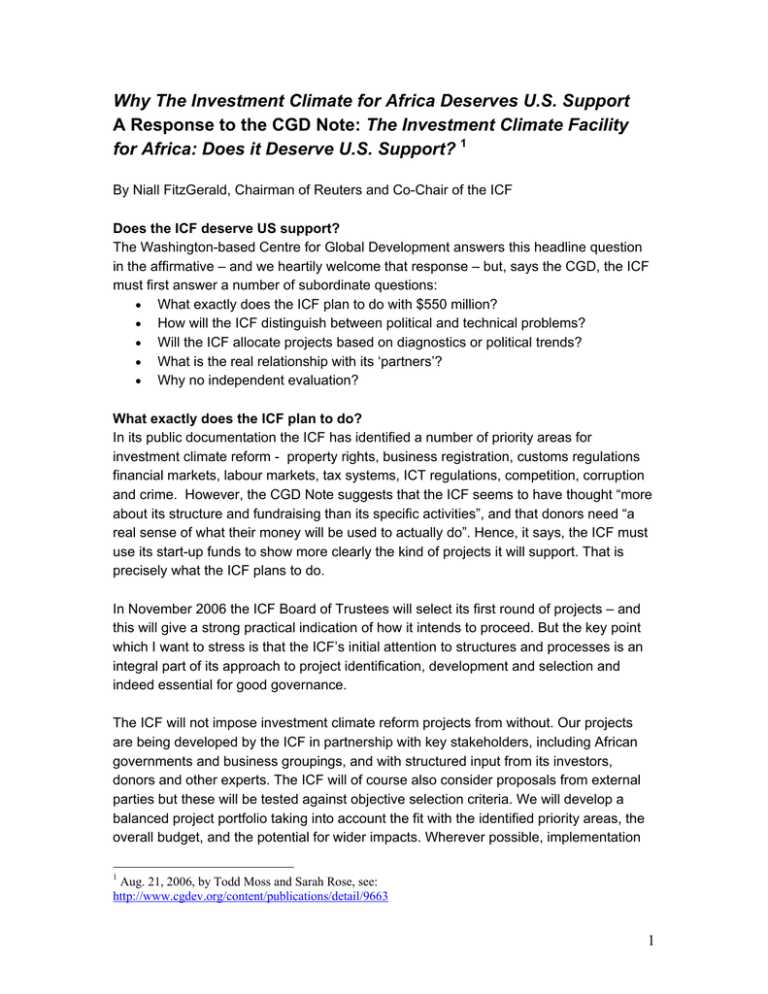
Why The Investment Climate for Africa Deserves U.S. Support A Response to the CGD Note: The Investment Climate Facility for Africa: Does it Deserve U.S. Support? 1 By Niall FitzGerald, Chairman of Reuters and Co-Chair of the ICF Does the ICF deserve US support? The Washington-based Centre for Global Development answers this headline question in the affirmative – and we heartily welcome that response – but, says the CGD, the ICF must first answer a number of subordinate questions: • What exactly does the ICF plan to do with $550 million? • How will the ICF distinguish between political and technical problems? • Will the ICF allocate projects based on diagnostics or political trends? • What is the real relationship with its ‘partners’? • Why no independent evaluation? What exactly does the ICF plan to do? In its public documentation the ICF has identified a number of priority areas for investment climate reform - property rights, business registration, customs regulations financial markets, labour markets, tax systems, ICT regulations, competition, corruption and crime. However, the CGD Note suggests that the ICF seems to have thought “more about its structure and fundraising than its specific activities”, and that donors need “a real sense of what their money will be used to actually do”. Hence, it says, the ICF must use its start-up funds to show more clearly the kind of projects it will support. That is precisely what the ICF plans to do. In November 2006 the ICF Board of Trustees will select its first round of projects – and this will give a strong practical indication of how it intends to proceed. But the key point which I want to stress is that the ICF’s initial attention to structures and processes is an integral part of its approach to project identification, development and selection and indeed essential for good governance. The ICF will not impose investment climate reform projects from without. Our projects are being developed by the ICF in partnership with key stakeholders, including African governments and business groupings, and with structured input from its investors, donors and other experts. The ICF will of course also consider proposals from external parties but these will be tested against objective selection criteria. We will develop a balanced project portfolio taking into account the fit with the identified priority areas, the overall budget, and the potential for wider impacts. Wherever possible, implementation 1 Aug. 21, 2006, by Todd Moss and Sarah Rose, see: http://www.cgdev.org/content/publications/detail/9663 1 will involve a ‘task force’ approach through coalitions of key actors from the public and private sectors, to identify issues and secure their commitment from the outset. Each project (and task force) will be committed to and measured by specific outputs and a clear timetable. How will the ICF distinguish between political and technical problems? The CGD cautions that a strictly technical approach to removing investment barriers will fail - political obstacles to meaningful change must be addressed. We agree absolutely. This underpins our approach to project development and coalition-building in-country and regionally. Significantly, the ICF has two co-chairs, and my colleague Benjamin Mkapa is specifically responsible for liaison with African governments and other relevant organisations and institutions. We have stressed time and again that the positive involvement and responsiveness of African governments is crucial to success. High level decision-makers and implementers must be actively involved in ICF interventions to ensure the success and sustainability of these initiatives. Indeed unless there is clear commitment to political support for implementation we will not proceed with a project. What is the real relationship with the ICF’s ‘partners’? The CGD raises a number of concerns in this regard. I welcome the opportunity to clarify any misconceptions and set the record straight. According to the CGD Note, the ICF is “vaguely connected” to a number of other organizations (it mentions the AU, NEPAD, and Business Action for Africa) but that their various role “are muddled”. It also questions the ICF's claim to African ‘ownership’; and suggests that DFID (the UK’s Department for International Development) appears to be “the driving force behind the scenes”. DFID indeed has played an important role in endorsing and supporting the ICF – and that has always been publicly acknowledged – but it is certainly not the “driving force”, nor are its interests covert in any way. The ICF has developed as a unique international partnership between the private sector, governments and other organisations. It originated in Africa in the shared efforts of a number of far-sighted individuals to find a practical response to the continent’s investment climate challenges. These individuals subsequently approached DFID and the Danish International Development Agency (DANIDA) for seed funding to test and explore the appetite for the establishment of an investment climate facility. Over the past two years or more the concept has gained increasing support in various African forums. The ICF was adopted as a flagship programme of NEPAD’s private sector strategy, and it has been formally endorsed by both NEPAD and the African Union. NEPAD sits as an observer on the ICF Board, where it also represents the AU Commission. The ICF is strongly supported by the African Development Bank, which 2 has not only committed significant funding to the Facility but formally confirmed its intention to work collaboratively and cooperatively with the ICF. The ICF is governed by a Board of Trustees, all of whom have a deep involvement in Africa. The full Board will comprise 11 trustees. Eight are now in place: the two cochairs, Niall FitzGerald KBE and HE Benjamin Mkapa; and Sam Jonah KBE, Dr William Kalema, Henri Bonpun, Lazarus Zim, Dr Nkosana Moyo, and Lynda, Baroness Chalker. These trustees all serve in their individual capacity. The ICF donor countries collectively will nominate three representatives to the Board in due course. At this point committed and pledged donors and investors in the ICF are the UK – which was the first country to commit its support publicly, in November 2005 - the Netherlands, Ireland, Norway , the EU, the World Bank’s International Finance Corporation, the African Development Bank, and seven multinationals The ICF encourages investors to bring more than their funding to the table. Donor organisations and companies that invest in the ICF also contribute their skills, expertise and experience. They have appointed individuals with extensive experience of working in Africa to sit on a Technical Advisory Committee (TAC) to provide input into project development and selection. This is clearly an extremely valuable pool of knowledge on which to draw. As to Business Action for Africa, several of the ICF’s corporate investors are members of this international business network. There is considerable synergy between the objectives of the two bodies but there is no formal relationship. The organisations will however collaborate where appropriate to achieve shared goals. Will the ICF allocate projects based on diagnostics or political trends? The CGD expresses concern about factors that may influence allocation of funding, particularly the ‘prejudices of donors.’ The importance of fair and transparent decisionmaking processes cannot be over-stated. The ICF has put a great deal of time and energy into establishing robust governance and administrative structures. The Facility has drawn on the great expertise at its disposal to develop fair and transparent fund management procedures to govern project design and selection. All proposals will be evaluated against objective, open and publicly known selection criteria to ensure an appropriate fit with the ICF’s strategic objectives, and complementarities with existing initiatives. Projects will be subject to a stringent due diligence process. Key criteria include the need for genuine, relevant and representative support and, where appropriate, involvement from the local private sector, together with appropriate government and political support for engagement in the project and implementation of the proposed activities. 3 The Board of Trustees makes the decisions – funders do not have any direct say, though they play an advisory role in the project selection process. Why no independent evaluation? I’m puzzled by this question. We concur absolutely with the CGD that independent external evaluation is essential. Arrangements are in place for ICF investors as a group to commission an independent assessment of the ICF’s performance and impacts every two years against objective investment climate indicators. In addition, the ICF is committed to an annual review of its own performance against key performance indicators. The draw down of investor funds for each new financial year is dependent on successful performance against these KPIs. At its AGMs the Board will account formally for the ICF’s work and budget to ICF investors, and it will make periodic progress reports to NEPAD and the African Union. Final point of clarification A point of clarification on funding: The CGD Note says that the ICF has “already raised $90 million”. In fact, by the end of August 2006 the ICF’s capitalisation for its first three years of operation had reached US$117.4 million in committed and pledged funds. The UK, the Netherlands and Ireland, together with the World Bank’s International Finance Corporation, had committed US$81.5 million in total. In addition, Norway, the European Union and the African Development Bank have pledged their monetary support. The ICF at present has seven committed corporate investors, and is in discussion with others. Anglo American plc, Royal Dutch Shell and the Shell Foundation, Unilever plc, SABMiller, Coca-Cola, Celtel, and Standard Bank have collectively committed a total of US$16 million to the Facility. However, the ICF’s greatest strength, as the CGD recognises, is that it is indeed “a timely initiative for a critical issue”. 4
